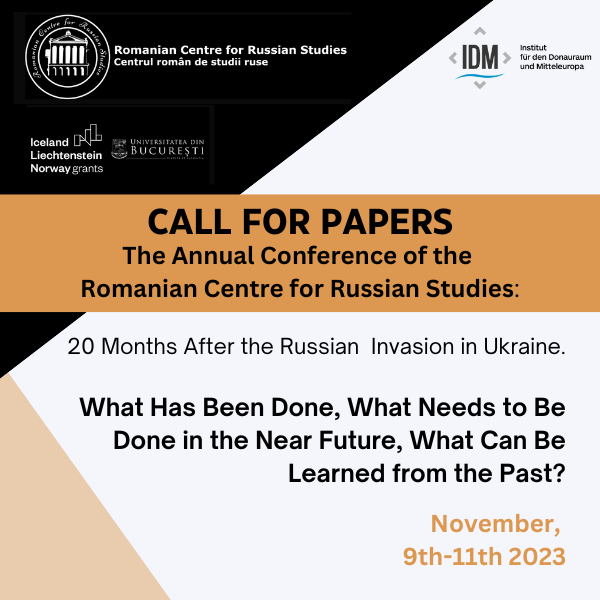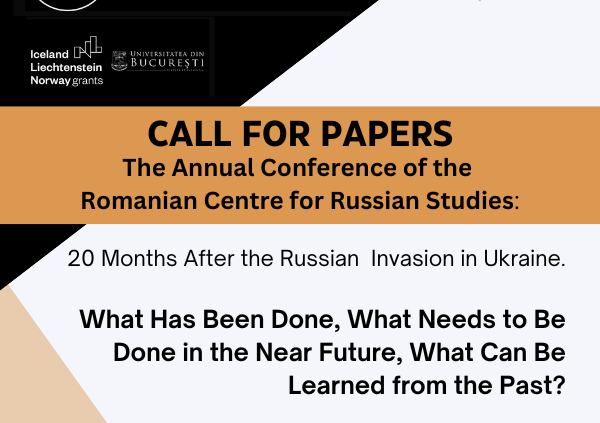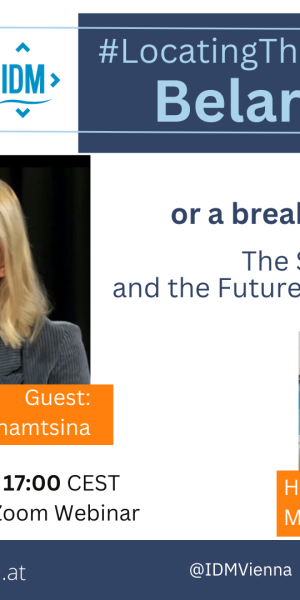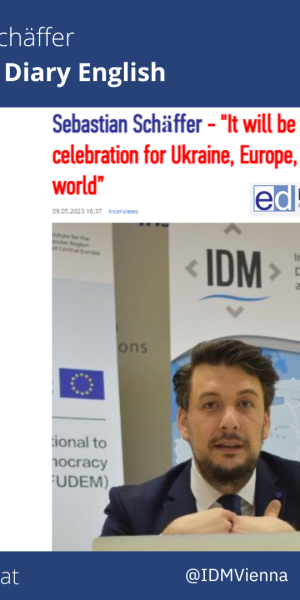Call for Papers – The Annual Conference of the Romanian Centre for Russian Studies

The Romanian Centre for Russian Studies (University of Bucharest)
The Fridtjof Nansen Institute (Oslo)
The Institute for the Danube Region and Central Europe (Vienna)
are pleased to invite you to
The Annual Conference of the Romanian Centre for Russian Studies:
20 Months After the Russian Invasion in Ukraine.
What Has Been Done, What Needs to Be Done in the Near Future, What Can Be Learned from the Past?
November, 9th-11th 2023
University of Bucharest, Romania
The Russian invasion of Ukraine, launched on February 24th 2022, triggered a consistent humanitarian, financial, and military response from the EU and the NATO members, as well as from other countries around the world.
The international assistance has played an important role in the Ukrainian resistance against Russian aggression, even though the received aid did not always meet expectations. A consistent aid for Ukraine, be it humanitarian, financial, or military will also be needed after this long conflict. The outlook and conditions for further integration of Ukraine in the EU and NATO is already on the international agenda.
The first conference organised by the Romanian Center for Russian Studies of the University of Bucharest and the Fridtjof Nansen Institute in Oslo on November, 3rd-5th 2022, gathered more than 42 scholars from 11 countries who engaged in an in-depth discussion about the geopolitical challenges of Russian aggression in Ukraine.
The second conference scheduled on November, 9th-11th 2023, aims at providing a platform for qualitative and quantitative analyses of the assistance and support given to Ukraine since the full-scale invasion and also to discuss the outlook and conditions for further integration of Ukraine in the EU and NATO based on the experience from integration of other East European countries and former Soviet republics. The conference will bring together senior specialists as well as emerging scholars. The format will be a combination of paper presentations and discussion panels.
The Conference Committee welcomes papers, theoretical or empirical contributions, related to the following topics:
- Promises, constraints, and deliveries in military aid to Ukraine after the Russian invasion
- International mobilisation towards Ukraine’s economic and humanitarian aid: qualitative and quantitative analyses
- The enlargement of the EU from 1994 onwards: Lessons for Ukraine
- Integration of new members in NATO: Lessons learned
- EU and NATO cooperation: what has been done, what needs to be done
- Changes in the Northern European mindset about Russia and European order
- New challenges and strategic projects in the Black Sea Region
- Russian energy exports to Europe: political significance and outlook
- The Republic of Moldova: a potential target of Russia?
- Strategies, tools, and agents of Russian propaganda in Western countries
- Ukraine`s refugees – integration policies and public perceptions
- The war in Ukraine: specific strategic challenges and possible opportunities for East European countries
- Rethinking the history of Eastern Europe: past and present approaches
- Peace in Ukraine – any horizon?
Special Session
On the 5th of December 2023, our partner, the Institute for The Danube Region and Central Europe (IDM Vienna) celebrates 70 years. To mark the anniversary, we will organise a special round-table discussion on the following topics: the EU enlargement and integration, conditions for a good neighborhoud relationship, and the development of democracy and multilateralism, all of them within the broader context of the Russian aggression in Ukraine.
Financial Conditions
As part of our endeavour to encourage and promote young researchers in the field of Russian studies, we offer those accepted the financial support needed to cover travel costs (up to 300 Euros). Selection is based on the academic quality of the abstracts; the motivation letter, submitted alongside the abstract, is important.
The conference organizers encourage Ukraine-based and displaced Ukrainian scholars to participate in the event and may cover all costs for them, by competition.
For all other participants, three days accommodation and meals are covered by organisers.
There is no participation fee.
The conference is organised with the support of 2014-2021 EEA Financial Mechanism 2014-2021 through EEA grants for Collaborative Research, Grant No. 35/2021.
Format
The Conference is held in a hybrid format: in-person participation in Bucharest, Romania, and virtual meetings on a specialised platform. In-person participation is encouraged.
Application
Please complete the attached application form, including:
- Paper abstract (up to 300 words),
- Short biography (up to 150 words)
- Motivation letter (up to 300 words) for participants needing travel financial assistance
The ditto documents have to be sent via email to mariusdiaconescu@istorie.unibuc.ro by July 15th, 2023, in English.
Successful applicants will be notified via email by September 1st, 2023.
Conference language: English.
Academic Committee:
Prof. Dr. Mihai Răzvan Ungureanu (University of Bucharest)
Prof. Dr. Arild Moe (Fridtjof Nansen Institute)
Prof. Dr. Iver Neumann (Fridtjof Nansen Institute)
Mag. Sebastian Schäffer (Institute for Danube Region and Central Europe)
Prof. Dr. Armand Goșu (University of Bucharest)
Prof. Dr. Radu Carp (University of Bucharest)
Organising Committee:
Dr. Marius Diaconescu (University of Bucharest)
Dr. Anne-Kristin Jørgensen (Fridtjof Nansen Institute)
Dr. Iulia Mustățea (University of Bucharest)
Dr. Tatiana Cojocari (University of Bucharest)
Contact: office@russianstudiesromania.eu
Please contact us, should there be any questions.
Important dates:
Deadline for submitting applications: July 15th, 2023.
Notification of acceptance: September 1st, 2023.
Conference: November 9th-11th, 2023.
Romanian Centre for Russian Studies – Insights
International Conference, November 2022, program and media coverage:
Geopolitical challenges of the Russo-Ukrainian War from the Black Sea to the Arctic Ocean



